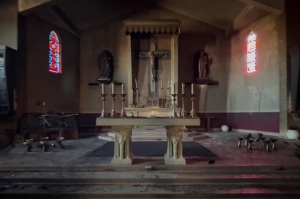Assessing the Amendments to the Constitution
GREENVILLE, SC - The 214th General Assembly (2002) of the Presbyterian Church (USA) approved 13 amendments to The Book of Order and recommended them to the 173 presbyteries for ratification.
A majority of the presbyteries must vote in the affirmative for an amendment to pass. The votes will be reported to the 215th General Assembly in Denver and all those ratified will take effect at that time.
Brief pro and con arguments are given for each amendment:
Amendment 02-A includes five subsections. They may be voted on as a group, but each subsection stands as a separate amendment and a vote count must be reported on each. These five would establish the ordination of Christian educators as ministers of the Word and Sacrament with a specialization in educational ministry. The fourth section is a grandparent clause that would allow ordination as ministers for certain current Christian educators without their having to meet the requirements for ministers. All of the recommendations originated with the Task Force on Educational Design for the Ordination of Christian Educators established by the 212th General Assembly (2000). The task force did not consider creation of a fourth ordained office for Christian educators.
Overall Pro: Educators who have master's degrees in Christian education and/or have become certified are highly trained specialists who have a key role in a denomination that emphasizes education. But the church has not given educators the status, standards, compensation or support they deserve. They are called by sessions and can be dismissed by sessions, sometimes without adequate hearings, and are therefore vulnerable. Their salaries tend to be low although they put in long, hard hours. Since presbytery is not involved in their call, the role of presbytery in their support and oversight is unclear. They have no vote at presbytery though they may know more about the church and its beliefs than many elders (and some ministers). Educators work through stiff requirements for certification, while commissioned lay pastors, who have much less training, are allowed to do almost anything a fully trained minister can do. Educators with little formal training have little incentive, o! ther than the love of doing a good job, to persevere through the long road to certification, though doing so would strengthen the church's educational ministry. Qualified educators need to be ordained. Overall Con: Ordination is to a certain function in the church, not to status or power. The function of the minister of the Word and Sacrament is to properly preach the Word and administer the sacraments. The Book of Order (G-6.0203) already provides for the designation of ministers of the Word and Sacrament as "educators, chaplains, pastoral counselors, campus ministers, missionaries, partners in mission, evangelists, administrators, social workers, consultants or other specific tasks appropriate to the ministry of the church " Many ministers serve in educational roles as associate pastors for education, on presbytery staffs, in colleges or seminaries as professors. These most often have extra formal training beyond the basic master of divinity degree. Presbyteries may already ordain persons under the extraordinary provisions. Why, then, these amendments? If it is simply to give permission to people to pursue these routes, let the church do that without amending the Constitu! tion. The amendments are simply not necessary.
Amendment 02-A.1 would add the word "teacher" to the list of names describing the duties of ministers of Word and Sacrament. The Advisory Committee on the Constitution (ACC) advised the General Assembly to disapprove the addition. The ACC said the change would "violate" the reason the section was restored last year, which was to recapture "the historic definition of a minister as pastor" traceable to the original Form of Government of 1789. The Assembly Committee on Church Orders and Ministry recommended the change by a vote of 37/10/2 (for/against/abstain) and the Assembly approved the committee's recommendation by a show of hands.
Pro: Teaching is a natural function of ministers, who have been referred to as teaching elders in the past and who may be designated as "educators" according to The Book of Order, G-6.0203. Con: Ministers may already be designated as "educators," according to G-6.0203. Therefore, there is no need to violate the historic definition, which might lead to additions such as "chaplain," "pastoral counselor," "campus minister," etc. as found in G-6.0203.
Amendment 02-A.2 would establish standards and requirements for candidates for the ministry of Word and Sacraments seeking specialization in educational ministry. The ACC recommended disapproval of the proposed amendment saying current language provides latitude for measuring the necessary qualifications for ministers. The Assembly committee recommended approval by a vote of 42/9/0 and the Assembly approved the committee's recommendation by a voice vote.
Pro: Those preparing for ministry with a specialization in education need to be adequately prepared for their work, and these standards provide the requirements. Con: Standards for specialized ministries such as educators, pastoral counselors and others named in Book of Order G-6.0203 should be in a separate manual and not in the Constitution, which already has the character of a manual of operations. The Book of Order language already has adequate latitude.
Amendment 02-A.3 would permit a lesson planned and taught to be substituted for a sermon in presbytery examinations for ministers of Word and Sacrament. The ACC advised disapproval of the proposed amendment, saying that it is not needed because presbyteries can already prescribe an additional demonstration of ability for a specialized ministry, and because the addition would "profoundly" change the requirements and theological bedrock for the office of ministry. The Assembly committee recommended approval of the proposed amendment by a vote of 29/22/0, and the Assembly approved the committee's recommendation by a vote of 341/154/3.
Pro: The addition legitimizes the role of the minister of Word and Sacrament as teacher and allows a candidate for ministry with specialization in education to demonstrate, and the presbytery to evaluate, his or her ability to teach. Con: Those who are to be ordained to the ministry of Word and Sacrament, even with a specialization in educational ministry, need to demonstrate an ability to preach, because they may be expected to preach in the churches where they are called, or to supply other pulpits, or to do interims. Qualifications for the specialization should be in addition to, not in place of, qualifications in preaching and in administration of the sacraments.
Amendment 02-A.4 is a grandparent clause that would allow certain educators to be ordained as ministers of the Word and Sacrament without meeting the educational requirements for ministers by a three-fourths vote of presbytery. The presbytery may specify an alternative course of study (G-14.0313a). This applies to a small number of highly trained, veteran educators who could not or would not seek master of divinity degrees. The ACC advised disapproval of the proposed amendment because presbyteries may already ordain persons by waiving the educational requirements by a three-fourths vote and by prescribing an alternate means of examination (G-14.0313). The Assembly committee recommended approval by a vote of 39/10/0 and the Assembly approved the recommendation by a vote of 327/169/7.
Pro: Most educators have not been ministers and, because they are church employees who often don't belong to the church where they work, are not asked to serve as elders, either. Just before Presbyterian reunion in 1983, the Presbyterian Church in the United States (southern stream) approved a fourth ordained office for educators, but because of reunion the plan was never implemented. The many hundreds of trained directors of Christian education in that denomination (most of them women) were deeply disappointed. The current proposal, shaped by the concern that a fourth ordained office would create confusion and ecumenical difficulties, instead proposes slight variations in the requirements for ministry of Word and Sacrament to attract those whose principal interest is education. It also offers guidelines for the extraordinary ordination, during a brief period, of certified educators, some of whom have been waiting since 1983 for the church to resolve the question of educators! ' ordination. Con: Ordination is to serve the church, not the individual. Ordination is to a function, not to status or power. Those who are ordained ministers of Word and Sacrament should primarily fill the function of preaching and administering the sacraments. This amendment serves the needs of certain highly deserving, highly-trained educators, but the needs of the church for them to be ordained to this function seems to be a secondary consideration. The amendment is right to say this ordination should be done only when a "presbytery determines that a strategy for mission requires it." The amendment would present some difficult decisions for presbyteries, which may feel pressed to reward qualified veteran educators with ordination, though the strategies of mission do not require it. The Book of Order already allows presbyteries to ordain persons by extraordinary means (G-14.0313).
Amendment 02-A.5 would permit a certified Christian educator who is approved for ordination as a minister of Word and Sacrament to be elected as an associate pastor in the congregation currently being served. This amendment is dependent upon the approval of the previous amendment (02-A.4, the grandparent clause). The ACC recommended disapproval of this proposed amendment because it goes against the premise that a full, open search be conducted for any pastoral position. The Assembly committee recommended approval by a vote of 27/19/0 and the Assembly approved the recommendation by a vote of 327/169/7.
Pro: A certified Christian educator approved for ordination under 02-4.A shouldn't have to search for a new position in which to serve. The session and congregation aren't seeking to create a new position, but to ordain the current person and convert the position to that of associate pastor. Con: Even when a congregation is completely satisfied with the person and work of a certified Christian educator, a full, open search is needed for this broadened position.
Amendment 02-B would provide for the election of members of the General Assembly Nominating Committee by the General Assembly rather than by their appointment by previous General Assembly moderators. They would be nominated by the previous moderator and elected by the Assembly. The proposed amendment originated with overture 02-16 from the Presbytery of Western Colorado and was referred to the Assembly Committee on General Assembly Procedures. The ACC recommended disapproval of the overture, as did the Committee on the Office of the General Assembly (COGA) and the Advocacy Committee on Racial Ethnic Concerns. The ACC recommended alternate language if the action was approved. The Assembly committee recommended approval of the ACC's alternate wording by a vote of 40/3/0 and the Assembly approved the committee's recommendation by a vote of 361/137/7.
Pro: General Assembly moderators wield a great deal of power in appointing Assembly committee moderators, vice-moderators and committee assistants in consultation with COGA and the stated clerk. Selection of nominating committee members, who nominate persons to fill a wide array of boards, agencies and committees that serve throughout the years should belong to the wider governing body than to an individual. The same distribution of synods, ministers, laywomen and laymen would be required. Con: The role of the moderator in selecting these persons would be diminished. The present system assures appointments in accord with the Assembly that elected the moderator.
Amendment 02-C includes five subsections. They may be voted on as a group but each subsection stands as a separate amendment and a vote count must be reported on each. Two of the five (02-C.3 and 02-C.4) are contingent on passage of the first one. These five would add the position of Certified Associate Christian Educator to The Book of Order (02-C.1), add worship and sacraments to the list of subjects on which an educator must be examined to become certified (02-C.2), add responsibilities of presbyteries in regard to Certified Christian Educators (02-C.3), require compensation and benefits guidelines for Certified Christian Educators (02-C.4), and require presbytery Committees on Ministry to oversee Certified Christian Educators (and Certified Associate Christian Educators). These amendments were referred to the Assembly Committee on Church Orders and Ministry.
Amendment 02-C.1 would add the position of Certified Associate Christian Educator to The Book of Order. The ACC advised the Assembly that this proposed amendment moves The Book of Order away from being a constitutional document and toward being a manual of operations. The Assembly committee recommended approval by a vote of 46/4/0 and the Assembly approved the recommendation with no objections.
Pro: This allows educators without master's degrees to gain extra training and be certified. Con: None.
Amendment 02-C.2 would add worship and sacraments to the list of subjects on which an educator must be examined in order to be certified. The ACC advised the Assembly that this proposed amendment moves The Book of Order away from being a constitutional document and toward being a manual of operations. The Assembly committee recommended approval by a vote of 46/4/0 and the Assembly approved the committee's recommendation with no objections.
Pro: This is a major part of the church's life about which educators teach, and should be required. Con: None.
Amendment 02-C.3 would require presbyteries to keep and report records regarding both categories of certified educators. The ACC advised that these would be helpful additions. The Assembly committee recommended approval by a vote of 46/4/0 and the Assembly approved the recommendation with no objections.
Pro: This is a non-controversial housekeeping matter. Con: None.
Amendment 02-C.4 would require compensation and benefits guidelines for Certified Associate Christian Educators. The ACC advised the Assembly that this proposed amendment moves The Book of Order away from being a constitutional document and toward being a manual of operations. The Assembly committee recommended approval by a vote of 46/4/0 and the Assembly approved the recommendation with no objections.
Pro: This is already provided for Certified Christian Educators and should also be provided for Certified Associate Christian Educators if 02-C.1 is approved. Con: None.
Amendment 02-C.5 would require presbytery Committees on Ministry to oversee Certified Christian Educators (and Certified Associate Christian Educators). The ACC advised disapproval, saying this makes oversight mandatory, while current language gives Certified Christian Educators full access without being mandated. The Assembly committee recommended approval by a vote of 31/10/0 and the Assembly approved the recommendation without objections.
Pro: This would afford support and oversight for educators who are often left alone at the mercy of the sessions that employ them. Con: It would add to an already full load carried by Committees on Ministry, and certified educators already have access to that support and oversight.
Amendment 02-D would clarify the meaning of the term "conference" when used with investigating committees. The ACC suggested alternative language to the originating presbytery's overture. The Assembly Committee on Church Polity recommended approval of the ACC wording by a vote of 49/0/0 and the Assembly approved the recommendation with no objections.
Pro: This is a useful clarification. Con: None.
Amendment 02-E would do away with the extension on time limits (statute of limitations) when an alternative form of resolution (D-10.0202g, 1-4) is initiated in investigative proceedings. This originated with a 2000 overture for 13 changes in The Book of Order from the Presbytery of Tropical Florida. It was referred to the Office of the General Assembly, which reduced it to five, and the Assembly reduced it to one. The ACC recommended approval. The Assembly Committee on Church Polity recommended approval by a vote of 44/5/0 and the Assembly approved the committee's recommendation by a vote of 318/160/16.
Pro: Removing the extension on the statute of limitations would prevent the introduction of an open-ended mediation period. Con: If the extension is removed, the statute of limitations might expire while the investigating committee is pursuing an alternate resolution, meaning that charges could not subsequently be filed should the alternative resolution fail.
By Bill Lancaster




























